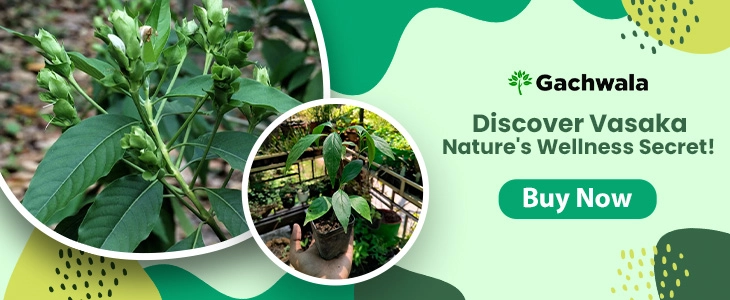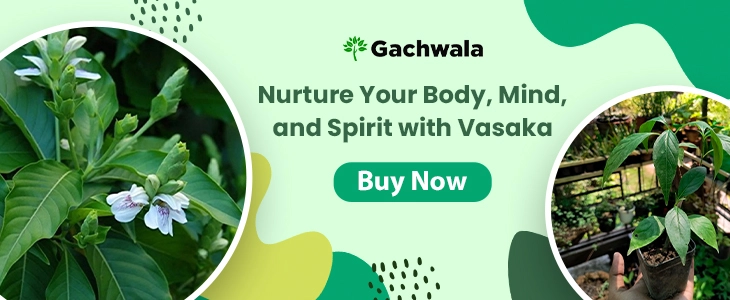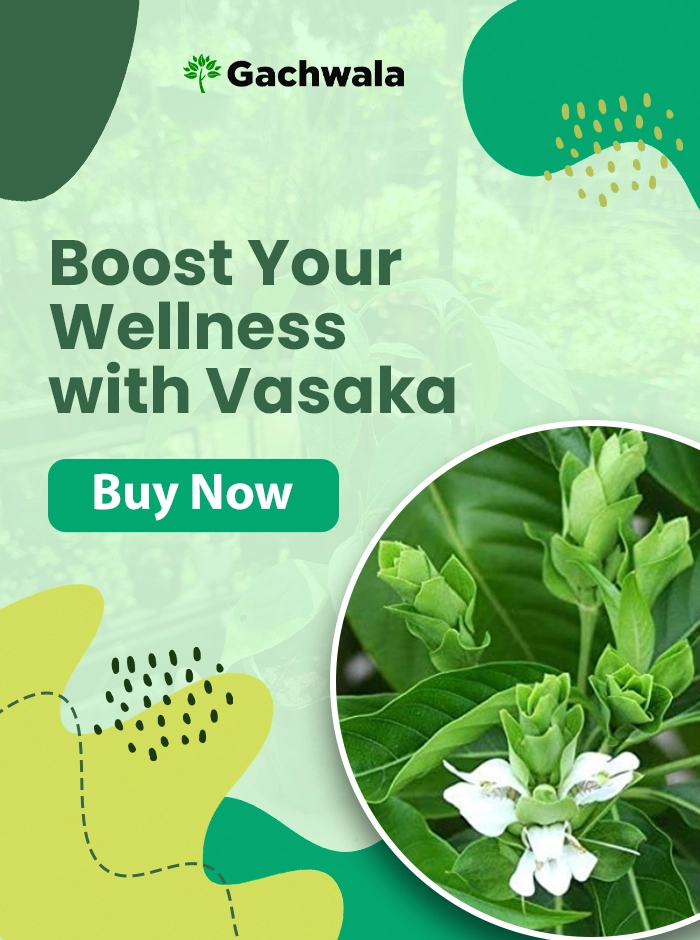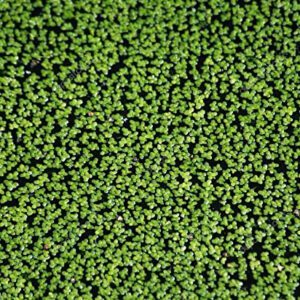Table of Contents
Introduction to Vasaka (Malabar Nut)
Trusted for centuries, Malabar Nut, or Vasaka as it is more scientifically known (Justicia adhatoda), is an herb whose therapeutic properties are revered and used in traditional healthcare systems, particularly Ayurveda.
Native to the Indian subcontinent, Acanthaceae family is the botanical family of the Vasaka shrub. It thrives in the climatic conditions ranging from tropical to subtropical and is also found in parts of Southeast Asia including China. The plant bears leaves that are lancet-shaped and layers of clusters of small flowers having colors that are either white or purple that add greatly to the plant’s beauty in terms of botany.
The multifaceted healing properties of Vasaka have been phenomenal. There are documents that date back thousands of years as well as manuscripts in which the ancient herb was indicated to manage problems like breathing issues, infections, and inflammation. Indeed, it was known by physicians not only for its curative but also its preventive nature for the overall dandy health and vigour.
Hindi Name: Adusa/Vasaka
Sanskrit Name: Vasa
English Name: Malabar Nut
Latin Name: Adhatoda vasica Nees
Nutrients of Vasaka
Vasaka, which is also known as Malabar Nut, is packed with a wide variety of bioactive compounds, but they do not contain the necessary nutrients like minerals and vitamins. Despite that, it is still rich in different phytochemicals that promote their medicinal values. Below is a list of important bioactive compounds that can be found in them:
Vasicine: This is an alkaloid that is one of the main bioactive substances in Vasaka. It is renowned for its bronchodilator and expectorant properties, offering significant benefits against respiratory diseases
Vasicinone: One of the crucial alkaloids present in Vasaka, vasicinone has the ability to counteract bacteria and have an anti-inflammatory effect, giving it its therapeutic value.
Quinazoline alkaloids: Vasaka is a supply of several quinazoline alkaloids, such as vasicinol and vasicinolone, which have passed some of the required research to take their pharmacological testing, such as bronchodilation, anti-inflammatory, antioxidant, and many more.
Flavonoids: Vasaka is fundamental to many flavonoids of which kaempferol and quercetin are the best known for their antioxidant and anti-inflammatory properties as they help the cells to get rid of oxidative stress and inflammation in the body to come down.
Tannins: Tannins help to function as an astringent of Vasaka that would be beneficial in wound healing and control of ulcers may also improve.
Essential oils: Vasaka espouses and lives through thousands of plant compounds which are in its oily essence and that can be procured organically plant materials if extracted carefully and properly unlike the drugs which have to be mass production type.
Even though Vasaka may not be supplying some remarkable nutrients, in the traditional sense, such as thermenutrients, its rich diversity of bioactive compounds promises high contents of anti-aging elements as by special focus on respiratory health as well as a boost to the natural immunity.
Health Benefits of Vasaka
Respiratory Health: Vasaka has long been prized for its effectiveness in treating a wide range of respiratory conditions. Its expectorant properties help to alleviate coughs by loosening and expelling mucus from the airways. It is particularly beneficial in cases of asthma, bronchitis, and common colds, providing relief from symptoms and promoting easier breathing.
Anti-inflammatory Properties: Vasaka exhibits potent anti-inflammatory effects, which can help reduce inflammation throughout the body. This property makes it valuable in the management of conditions characterized by inflammation, such as arthritis and inflammatory bowel diseases.
Antioxidant Effects: Vasaka contains compounds with strong antioxidant properties, which help protect the body against oxidative stress and damage caused by free radicals. By neutralizing these harmful molecules, Vasaka contributes to overall health and may lower the risk of chronic diseases such as heart disease and cancer.
Antimicrobial Activity: Vasaka demonstrates significant antimicrobial activity against both bacterial and viral pathogens. It can inhibit the growth and spread of various harmful microorganisms, making it a valuable ally in fighting infections. This antimicrobial action extends to respiratory infections, skin infections, and gastrointestinal infections.
Expectorant Properties: One of the key benefits of Vasaka is its ability to act as an expectorant, facilitating the expulsion of mucus from the respiratory tract. By promoting the clearance of phlegm and congestion, Vasaka helps to relieve coughs and congestion associated with respiratory illnesses, promoting respiratory comfort and function.
Wound Healing: Vasaka possesses properties that promote wound healing and tissue repair. When applied topically or consumed internally, it can accelerate the healing process of wounds, cuts, and ulcers. Its antimicrobial activity also helps prevent infections, allowing wounds to heal more effectively.
Ulcer Management: Vasaka has been traditionally used in the management of ulcers, including peptic ulcers and mouth ulcers. Its anti-inflammatory and antimicrobial properties help soothe irritation and promote healing of ulcerated tissues, providing relief from discomfort and aiding in ulcer recovery.
Tuberculosis Support: In both ауurvеdiс and traditional mеdiсinе, Vаѕаkа hаѕ bееn соnѕidеrеd one оf thе аdjunсtivе thеrарiеѕ tо thе tubеrсlоѕiѕ patients. Vasaka is a very effective treatment for acute respiratory infections such as tuberculosis and the primary ingredient for this positive expected result is its strong expectorant/antibatterial activity. It actually acts in the immune system of the man and provides an antitumor effect against tuberculosis infection.
Blood Purification: Vasaka is known to posses blood-cleansing properties which indicate the contributory factor of such cleansing to its detoxifying effects in the body. Thanks to getting rid of the toxins and impurities from the blood, the health of the person becomes very vibrant and energetic. What happens in the body is that it becomes so autoimmune that the nutrients can be distributed equally throughout the body to various parts and areas.
The varied health benefits add to its versatility: Vasaba is good for the cure of various diseases, for instance, the respiratory health is one of the main areas of interest due to the improvement of the overall immunity.
Common Uses of Vasaka
Traditional Preparations: Vasaka has been used traditionally as a medicinal herb in various ways since the early history. One common method of preparation is an herbal tea which is created by immersing dried leaves of Vasaka plant in boiled water so as to extract the medicinal compounds. Moreover, Vasaka powders are made by drying the leaves and grinding them for easy consumption or application on the skin.
Modern Formulations: In modern times, Vasaka is available in several formulations like capsules, tablets and syrups. So, what is the significance of this? These formulations provide standardized dosages of Vasaka extract, allowing the latter to be incorporated into daily therapeutic routines. On the one hand, hard capsules and tablets are perfect dosage forms, and on the other hand, the syrups are a more palatable option, especially for children and those who have difficulty swallowing pills.
Usage in Combination with Other Herbs: Vasaka is, as well often used in combination with other herbs to enhance its therapeutic effects or target specific health conditions. The combination of Vasaka with Ayurvedic herbs like “Haldi” and “Tulsi” and Ayurvedic herbs are often compounded to Ayurvedic formulas similar to “Rasayanas” etc. to boost immune response and, and Pulmonary health of the human body.
Integration into Ayurvedic Therapies: On the occasions of Ayurvedic diagnosis, Vasaka could be prescribed as part of individual wellness programs. Such plans are formed using personalized herbal remedies, nutritional advice, guidelines for us of a specific positive life-style, and treatment by employing alternative system. The goals of such a therapy are not only to eradicate the root cause of the illness but also to enhance the functionality of the whole body and make it disease-free.
Adaptation in Modern Herbal Medicine: Vasaka’s numerous uses have enabled it to find its way into primary healthcare practices globally. Herbalists and naturopaths could recommend Vasaka based on the evidence of nature’s power and scientific data.
Accessibility in Health and Wellness Products: Due to rising interest in using natural supplements and novel therapeutics, a range of Vasaka-containing products are found on the shelves of health food stores, pharmacies, or internet shops. On the availability of such products, a variety of options is upheld from individual-dose Vasaka supplements to composite herbal formulas created to address specific health issues.
By uncovering the vibrant uses of Vasaka both in the traditional context and the contemporary, humans can leverage the full potential of this medicinal herb for optimum health and wellbeing.

Dosage Recommendations
1. Typical Dosages for Various Forms:
Dried Leaf Powder: When you consume Vasaka in the form of dried leaf powder, you should take 1 to 3 grams per day divided into two or three doses. You can take the powder orally with water or mixed with honey for respiratory conditions.
Liquid Extract: In the case of liquid extracts of Vasaka, the recommended dose usually varies from 10 to 30 drops; the administration can be from one to three times, and therefore, it should be diluted in juice or water before consumption.
Capsules or Tablets: Depending on the strength and content of their medicines, there are both regular capsules and tablets also available for Vasaka, which are equipped with the proper dosage. The manufacturer’s instructions or consulting with your doctor would be a good idea for appropriate dosing.
2. Guidelines for Different Age Groups and Health Conditions:
Adults: Usually, grown-ups can follow the typical dosages mentioned above. However, individual needs can be different due to aspects such as illness severity being treated, overall health status and any concurrent medications or supplements being taken. It’s advisable to start with lower doses and gradually increase as needed under the guidance of a healthcare professional.
Children: Dosage for kids is partly based on their age, weight and specific health needs. It is necessary to examine with pediatricians or trusted healthcare practitioners before Vasaka can be used for the pediatric population.
3. Importance of Consulting with a Healthcare Provider:
- Before starting any new supplement regimen, be it Vasaka, it is crucial that a healthcare professional should be consulted, especially if you have pre-existing health problems, are pregnant or breastfeeding, or are taking medications.
- A healthcare provider can offer personalized recommendations tailored to your individual health needs and provide guidance on safe and effective dosage, potential interactions with medications, and monitoring for adverse effects.
- Additionally, a healthcare provider can help determine the appropriateness of Vasaka supplementation based on your overall health status, existing treatments, and goals for wellness.
4. Special Considerations:
- Individuals with chronic respiratory conditions such as asthma or bronchitis may benefit from long-term Vasaka supplementation. However, regular monitoring by a healthcare provider is advised to assess treatment efficacy and adjust dosages as needed.
- Pregnant and breastfeeding women should exercise caution when using Vasaka, as its safety during pregnancy and lactation has not been adequately studied. Consultation with a healthcare provider is essential before incorporating Vasaka into prenatal or postnatal care.
It is said that by correctly following the prescribed dosages and taking advice from a healthcare provider, patients are capable of introducing Vasaka carefully and effectively in their wellness schedules which would distance out more respiratory problems and increase their general wellbeing.
Possible Side Effects of Vasaka
Among all herbal medicines, Vasaka is one of the safest. When using it safely, however, it can still lead to side effects among certain people, particularly taking in high dosages and for long periods. It is important to observe these side effects and take the necessary caution to those who have problems with the health or take drugs.
1. Common Side Effects:
Nausea and Vomiting: A few individuals may suffer from abdominal discomfort such as nausea and vomiting involved in the Vasaka supply. These symptoms, which are usually transient, clear themselves with frequent Vasaka use.
Gastrointestinal Discomfort: Elaborately, Vasaka might cause digestive-related matters such as stomachache, bloating, or looseness of the bowels. The symptoms can be alleviated by using fewer doses or by eating food when taking Vasaka.
2. Rare but Serious Side Effects:
Allergic Reactions: Vasaka has the potential to result in allergic reactions, though it is relatively infrequent. The signs of such a condition are: rash, itching, swelling, difficulty of breathing, or dizziness. A physician must be contacted if the symptoms of an allergic reaction are present after taking Vasaka.
Interactions with Medications: Vasaka can interact with some chemicals, particularly the ones metabolized in the liver or involved in blood clotting. If you are someone who takes those medications, especially anticoagulants (blood thinners) or drugs for liver conditions, the best thing to do is to see a healthcare provider before you use Vasaka to avoid potential interactions
Pregnant and Breastfeeding Women: The safety of Vasaka supplementation during pregnancy and lactation as well as its use by mothers who are breastfeeding has not been well-established. Women who are pregnant and breastfeeding should do so with caution and also consult with a healthcare provider before using Vasaka to assess potential risks and benefits.
Children: If you use Vasaka, you should be extra careful with it in children, because safety and adequate dosages for them have not been well studied. Before you administer Vasaka to kids, it is advised to have consultation done with the pediatrician or a quailed healthcare provider.
Individuals with Underlying Health Conditions: If you have health issues such as liver diseases, kidney disorders, intestinal ailments or bleeding abnormalities, then it would be important to consult your doctor before using Vasaka to see if it is appropriate for you and to reduce the risk of any unwanted effects.
Please note that the information provided here is for educational purposes only and should not be taken as a substitute for professional medical advice. In case you develop worrying symptoms or have any questions regarding Vasaka supplement use, seek guidance from a practitioner for tailored advice and recommendations.
Where to Buy Vasaka Plants
If you ever wanted to grow Vasaka plant at home and benefit from their medicinal properties firsthand, then you will be glad to know that Gachwala has high-quality Vasaka plants for sale. Gachwala’s Vasaka plants are grown with care and expertise as they strive to provide authentic herbs which are organic.
Therefore, buying the plants from Gachwala will enable one access fresh leaves all the time for herbal teas, extracts or topical applications. These Vasaka plants by Gachwala are a great selection for your home garden whether you are an experienced herbal enthusiast or a new gardener interested in exploring medicinal plant kingdom.
For more information on the sales of Vasaka plants by Gachwala and how to place orders, go to their website or get in touch with their customer service department.

Conclusion
Malabar Nut (Vasaka), a natural wonder, is a testament of the wide range of herbal medicine and its numerous healing wonders that have been on for ages. This plant’s beneficial effects on respiratory health are profound; it has also antioxidant, anti-inflammatory and antimicrobial characteristics. Therefore, Vasaka remains one of the most revered traditional remedies worldwide.
We have seen that Vasaka encompasses various merits as it helps in respiratory conditions such as bronchitis, asthma and coughs and it is also involved in wound healing, ulcer management and blood cleansing. It was discovered through modern research that there are certain areas where Ayurveda treatment could be enhanced while at the same time the recommended usage of this herb was confirmed.
Nevertheless, despite several advantages that come with Vasaka use, it is important to note that any herbal remedy like this one has its own risks associated with it particularly when used wrongly or without proper guidance. However uncommon these may be though they may include nausea, allergic reactions or even interactions with other drugs hence care should be taken when using them.
In this light, therefore, individuals intending to use Vasaka as a supplement should be cautious and mindful. Before adding Vasaka to your health regimen, learn about its advantages, uses and drawbacks. To get customized guidelines based on your unique health situation and circumstances, you can seek the advice of a healthcare professional or qualified herbalist.
This way you will be able to make decisions that are well informed about Vasaka supplementation which will maximize its benefits while reducing any harm that may result from it. Remember that your health is priceless and should be taken care in the best possible manner.
Let Vasaka guide you towards vibrant health on the road of holistic medicine and may its curative abilities point you towards a life filled with vim and good fortune.
Additional Resources
1. Scientific Studies and Articles on Vasaka:
PubMed: This is an all-encompassing database of biomedical literature that includes research studies, clinical trials, and review articles on Vasaka and its medicinal properties.
Google Scholar: It is an academic search engine for scholarly articles, conference papers & patents. To find scientific literature on the topic, search for “Vasaka” or “Justicia adhatoda”.
2. References to Ayurvedic Texts and Traditional Medicine Literature:
Charaka Samhita: One of the basic texts in Ayurveda; it may have references to Vasaka as well as its use in traditional medical practices.
Sushruta Samhita: Another ancient Ayurvedic text that might shed some light on the medicinal values of Vasaka as well as its formulation.
3. Suggestions for Further Reading on Herbal Remedies and Natural Health:
- “The Encyclopedia of Medicinal Plants” by Andrew Chevallier – this is a comprehensive reference work which contains detailed information about the uses, benefits and preparations of medicinal plants like Vasaka;
- “Herbal Medicine: Biomolecular and Clinical Aspects” edited by Iris F. F. Benzie and Sissi Wachtel-Galor – a scholarly exploration into herbal medicine covering botanical, chemical pharmacological, clinical aspects of various medicaments.
- “The Complete Guide to Herbal Medicines” by Charles W. Fetrow and Juan R. Avila: A practical resource for understanding and using herbal remedies, featuring descriptions of individual herbs, including Vasaka, and their therapeutic properties.
Exploring these resources can provide readers with a deeper understanding of Vasaka and its role in traditional and modern healthcare practices, as well as insights into herbal remedies and natural health more broadly.
Frequently Asked Questions
What is Vasaka and what are its main benefits?
Vasaka, also referred to as Malabar Nut, is an herb that has been used for centuries in the traditional medicine practices like Ayurveda. Some of its main advantages include promoting respiratory health, reducing inflammatory effects and as an expectorant relieving a cough and congestion.
How is Vasaka typically consumed?
Vasaka can be consumed in different ways including dried leaf powder, liquid extract, capsules, tablets or syrups among others. It can be taken orally or applied topically depending on the particular health concern being addressed.
What are the potential side effects of Vasaka?
Although generally safe when used correctly, Vasaka may lead to nausea, vomiting and gastrointestinal distress in certain individuals. Infrequently occurring but severe side-effects include allergic reactions as well as drug-interactions.
Can pregnant women use vasaka during pregnancy and lactation?
In the course of these periods, Vasaka has not been proven to be safe and hence, pregnant and breastfeeding women should take caution. Vasaka may be used in prenatal or postnatal care after consulting with a medical professional.
Is vasaka good for kids?
For children, this remedy is not well-studied regarding its safety or proper dosage. It’s important to consult a pediatrician or an experienced healthcare provider before giving kids Vasaka.
How long does it take to experience the benefits of Vasaka?
The amount of time needed for someone to experience the improvements through the vasaka will differ from person to person, depending mainly on the intensity of disease, the amount of the dosage, and the form and the interoperability of supplements consumed. While there are indeed patients who might notice quick improvement in their condition, there are those that will need the use of Vasaka for a long period to attain the desirable result.
Can Vasaka be used alongside other medications or supplements?
It is recognized that Vasaka could have interactions with various medications, and these main interactions are usually with medications engaged at liver and blood clotting. Before Vasaka is used together with medications or supplements, a healthcare practitioner needs to be consulted to avoid unintentional interaction and for assurance of safety.
Where can I find more information about Vasaka and its uses?
Further information surrounding vasaka and its therapeutic properties may be provided by other resources like scientific studies, Ayurvedic texts, and herbal medicine books. Moreover, PubMed, and Google Scholar are excellent resources for this purpose.


